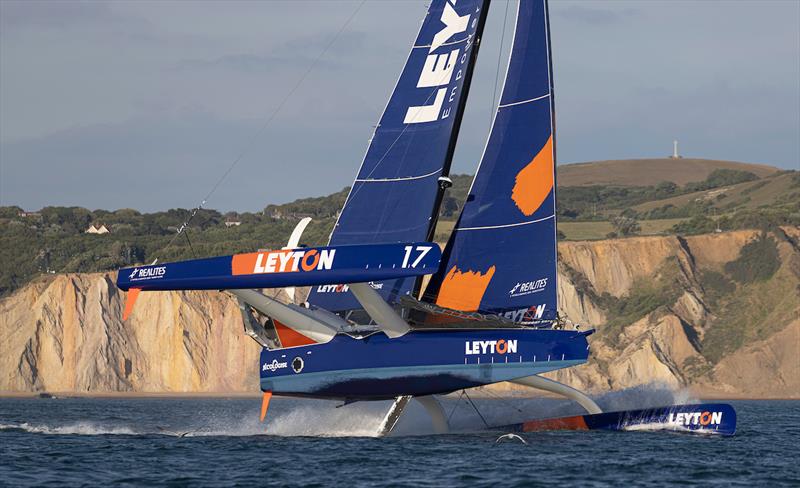
Interview with Gilles Chiorri - Rupert Holmes talks to the Pro Sailing Tour race director
by Rupert Holmes 8 Jul 2022 07:27 PDT

Layton passing The Needles in the Pro Sailing Tour finale © Mark Lloyd / Pro Sailing Tour
Rupert Holmes talked to Pro Sailing Tour race director Gilles Chiorri as the fleet set out from Cowes on the final 950 mile race of this year's championship.
The seven Ocean Fifty trimarans competing in the Pro Sailing Tour have enjoyed superbly close competition in the event's second season. At the start of the final race Quentin Vlamynck's Arkema led Sam Goodchild's Leyton by just one point and a third had a possibility of winning the championship. The course is an epic one, first to the Fastnet, then north up the west coast of Ireland to the Skellig islands, out to a waypoint in the Atlantic, back to south Brittany and then along the coast to Roscoff.
Rupert Holmes: This final race looks as though it will test a lot of different skills.
Gilles Chiorri: Yes - there's a lot to play for - with the tides and the coastline and with strategy because the wind is light and there may be big wind shifts as well. All the navigators will be working hard and rushing to get each new weather forecast when the models update. There's also a lot of suspense because the rankings are so close and this race will decide the championship.
RH: There's been a lot of focus on the skippers, but there are also some very experienced and successful sailors in the crews this year.
GC: Yes, we have some very talented sailors, including three times Figaro winner Yann Elias. On another boat we have Vendée Globe winner, Vincent Riou. Yet another boat has someone from a Sail GP and America's Cup team.
These sailors have raised the level of the game this season. Compared to last year, you can feel that they are pushing the boats much harder - they are close to the edge now.
RH: How much difference is there between the oldest and the newest boats in the fleet?
GC: Well that's a question I ask myself. At the end of the series, I suspect if you put the best team on the last boat they would probably become the best boat. So I think it's more about the crew than the boat itself - on average the performance is that close. You may find one boat faster than another upwind or downwind in certain conditions. But as an average they are very close - that's a benefit of the box rule.
RH: The format of the series seems to test a lot of skills, across short races and long offshore and ocean sailing.
GC: Exactly. And for the short races they also have to manage three guests onboard, so that's also part of the game. You need at least to take care of them and keep them safe. There is a lot of sponsor activation, as well, which is another dimension for the teams. The sailors are very aware of that and that they are lucky to have such a championship in place.
RH: Why is it important for the Pro Sailing Tour to come to the UK and especially to Cowes?
GC: I've been living here and I'm very pleased to see the race and all the well known familiar faces coming here. It's also symbolic because it's the capital of yachting in Europe and the sailing here is quite challenging. Yesterday we had a boat run aground [it hit the submarine barrier off Southsea]. We cannot criticise them, because everyone who has sailed here gets it wrong at least once in their life.
It's also good to bring this kind of sailing to the UK, because it's a different format from what you experience in UK waters, which outside of a few big teams like Ineos, is more focussed on private owners without sponsors.
Find out more at prosailingtour.com